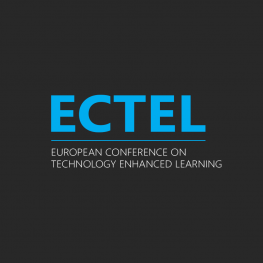Speakers
Matthieu Branthôme
Université de Bretagne Occidentale, CREAD - EA 3875, F-29238 Brest, FranceMarouane Talaa
Laboratory of Information and Educational Sciences and Technologies (LASTIE), Faculty of Sciences Ben M’sick, University Hassan II, Casablanca, MoroccoStart
16/09/2022 - 09:00
End
16/09/2022 - 10:30
Address
Room B307 View mapSession: Serious Games and computational thinking
Chair:  Roland Klemke
Roland Klemke
Pyrates: A Serious Game Designed to Support the Transition from Block-Based to Text-Based Programming
Matthieu Branthôme Université de Bretagne Occidentale, France
Abstract: This paper presents a design-based research which focuses on the design and the evaluation of the Pyrates online application. This serious game aims to introduce Python programming language supporting the transition from block-based languages. The layout of Pyrates’ learning environment is inspired from beneficial features of block-based programming editors. In order to evaluate this design, the application has been tested in eight classrooms with French 10-th grade students (n=240). Self-generated activity traces have been collected (n=69,701) and supplemented by a qualitative online survey. The data analysis shows that some of the design choices conduct to the expected effects. The creation of a “programming memo” (synthesized documentation) allows the discovery of algorithmic notions while offering a reference support for the Python syntax. The ease of copy-paste from this memo limits keyboarding. The integration of a syntax analyzer designed for beginners gives students a high level of autonomy in handling errors. However, other choices have rather deleterious impacts. For instance, the creation of a control panel for program executions proves to be dedicated to a trial-and-error programming approach or to “notional bypassing” strategies.
📄 Read More: https://link.springer.com/chapter/10.1007/978-3-031-16290-9_3
[Online] Medical Students’ Perception of a Serious Game (ECOGAME) of Simulating an OSCE Station: Case of Mohammed VI University of Health Sciences (UM6SS)
Marouane Talaa[1], Mohammed Chahbouni[2], Mounir Sadiq[1], Mohamed Radid[1] and Ghizlane Chemsi[1] [1] University Hassan II, Morocco [2] Mohammed VI University of Health Sciences (UM6SS), Morocco
Abstract: The Objective Structured Clinical Examination (OSCE) is a summative and certifying evaluation modality in the health sciences. It is a determining and crucial step in the student’s career, which requires the mobilization of knowledge, know-how and interpersonal skills. This generates problems such as time management and decision making during its passage. It is in this perspective that it seems interesting to design a digital simulation tool to reduce the intensity of these problems. To do this, we have designed a serious game (ECOGAME) based on the student’s clinical reasoning, which illustrates the passage from a surgical station in an OSCE. Experimentation was conducted with 116 students in the 7th year of medicine, followed by an evaluation of perception using a multidimensional questionnaire. The results show that the majority of students are satisfied with the usefulness and usability of the ECOGAME, and that the latter helped the students to overcome their difficulties during the passage of the station of surgery in the presential.
📄 Read More: https://link.springer.com/chapter/10.1007/978-3-031-16290-9_27
Computational Thinking: Focus on Pattern Identification
Marielle Léonard, Yvan Peter, Yann Secq and Cédric Fluckiger University of Lille, France
Abstract: This article focuses on pattern identification in the context of pupils aged 9 to 15 who are learning programming at school. In this context, programming puzzles that involve moving a robot on a 2D grid using a block-based programming language is common. We consider the ability to identify and formally characterize recurring structures within data or processes, to be a fundamental skill of computational thinking. In this article, we study the case where the motif (i.e. repeating unit) can be identified visually from the grid (obstacles, target…) for tasks involving the use of a loop. We ask what makes motif identification, and thus problem solving, difficult in this context. We provide a quantitative analysis based on the success rates of a hundred tasks from an online programming contest (200,000 participants). We have identified relevant features of the visual motif, which led us to specify five categories according to the degree of correspondence between the visual motif (2D grid) and the algorithmic motif (corresponding loop based program).
📄 Read More: https://link.springer.com/chapter/10.1007/978-3-031-16290-9_14


